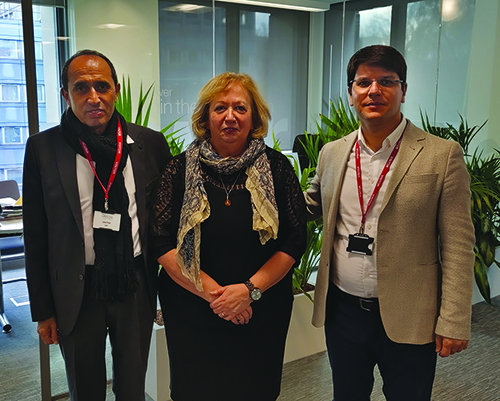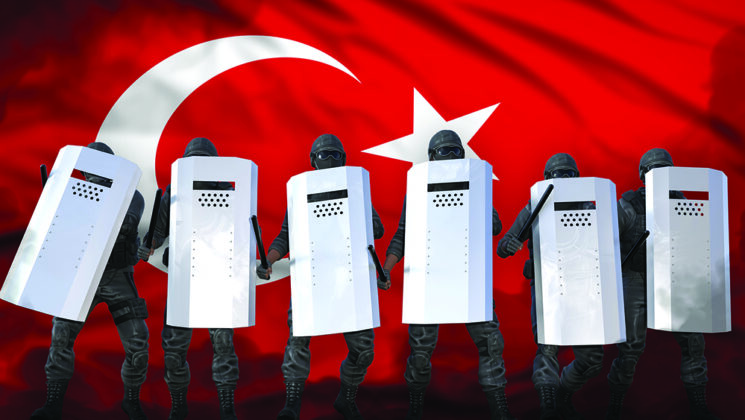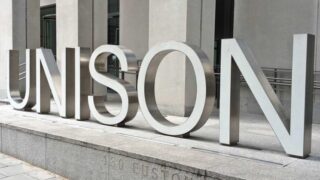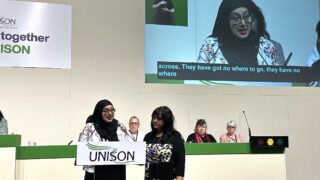Mehmet Bozgeyik is the president of KESK, the Confederation of Public Employees Trade Unions in Türkiye (the country rebranded last year from Turkey).
Before this, he’d spent much of his life working as a primary school teacher. But in the eyes of the country’s government, he’s a terrorist.
“I have been charged with being a member of a terrorist organisation because of my trade union work,” he explains.
In 2012, Mehmet was one of 72 trade unionists arrested on baseless terrorism charges and held in prison for almost 10 months. A decade later, his case has still not been heard.
“The anti-terror laws in Türkiye are very vague,” he explained, “which means they can be used against anyone, and the trials take a long time – often many years.
“This means that the government can put anyone who opposes them under judicial arrest, and they can do this without evidence. There is no separation of powers in Türkiye either, because the government and judiciary are connected. So there is no right to a fair trial.”
A tool of repression
Türkiye’s anti-terror laws are internationally known as a tool of repression, and have been widely condemned by the UN, the Council of Europe and Amnesty International.
A 2021 report from Amnesty found that these laws were “frequently misused against civil society actors and human rights defenders”. Such cases and trials can last years, so a terrorism charge becomes a punitive measure in itself, even if those accused are eventually acquitted.
Mehmet’s case is one tiny thread in a complex tapestry of anti-democratic attacks on trade union power in Türkiye that has stretched over decades.
Although personally unphased by the fact he’s been labelled a terrorist, it does come with consequences. “We’re not discouraged from doing our work because we know we’ve done nothing wrong. We know what the aim and objective of these trials are, and we will not let the pressure break us.
“But it does come at a personal cost. It creates a climate of fear because, when you’re labelled as a terrorist, people are afraid to be friends with you or even associated with you, in case it puts them at risk too.”
The bureaucracy of the criminal justice system also disrupts his trade union work. “The terror charges and trials will not stop us from doing our work, but they do take up our time. We have to go to court almost three times a week, sometimes five, which means we often have to reschedule our work. But we have to – when our friends are arrested by the police, we will always go and support them.”
Two of the activists Mehmet has been supporting are Gonul Erden and Selma Atabey, high-profile, female trade union leaders from the health services union SES. Both are charged with terrorism offences. Ms Erden still remains in pre-trial detention in prison. UNISON has attended several court hearings in their cases.

Mehmet Bozgeyik (left) with Christina McAnea and with human rights activist Osman Isçi (right) in London last year
Gender equality
Mehmet says it’s a gender equality issue. “These are women leaders who have spoken out about neoliberalism in healthcare and the need for high quality public health services – now they’re being targeted by the government”.
These trade union attacks come as part of a broader attack on public services by the government of Türkiye. While trade unions have been under pressure since 2009, matters took a distinct turn for the worse in 2016 when, after a failed coup, the government announced a ‘state of emergency’ where over 107,000 workers were instantly removed from their public sector jobs.
“There’s a trend of neoliberal policies at a global level, and Türkiye is no exception. Almost 70% of our public services are privatised. As a result, our taxes go to companies, not citizens.
“We believe that this money should go towards the people who use these services, and the employees who are providing them. But it doesn’t and we now face a real problem with job security.”
Privatisation
He tells a familiar tale of privatisation, and its impact on both workers and the quality of services: “In the past, working in public service was a permanent position. Now, it’s usually a contracted position that’s renewed every year, or is subcontracted, which means you work for a private company.
“Our public services are commodified, considered as private sectors to make money from, so we see a decrease in staff and lower salaries from both national and international companies whose focus is to make huge profits. The quality of public services decreases.”
Mehmet remains defiant: “We’re facing threats and charges, but we’re still organising in workplaces. We’re still talking to people. KESK recruited 25,000 new members in the past year alone.”
The union now represents 150,000 members, and its negotiations affect the two million public sector workers across Türkiye.
Solidarity
Mehmet emphasises the importance of international solidarity. “The problems that workers face, no matter where they are, are similar. This is why our struggle must be similar.
“As a trade union movement, we’ve made so much progress throughout history and neoliberal politicians are trying to take them away from us, one by one.
“We must act together against these policies. Our actions might not create change overnight, but it’s the only way change is ever going to happen. Solidarity isn’t a word that can remain on paper, it must be measured in concrete actions.
“Sending a message is a concrete action. International solidarity with trade union leaders in Türkiye is helpful for us because the government is trying to claim we are not legitimate organisers. International solidarity is proof that we are legitimate.
“Trade unionists can send messages to the government of Türkiye, but they should also send them to the governments of their respective countries. If their government has a trade agreement with Türkiye, and the unions say that trade agreements must respect certain criteria and standards, it will be helpful for us.”
International solidarity cuts both ways: “I would like to thank UNISON for its solidarity with us. We’re aware of the ongoing strike actions in the UK launched by UNISON members and we’d like to salute them. We wish them success, and they have our full support.”




2 thoughts on “Rebranded Türkiye – still branding trade unionists as terrorists”